Smalltown Hassle: the Babile Camel Market
I climbed on the bus and was mortified to find only one seat available: the sparsely-padded metal platform by the driver, facing the staring busload of passengers. I could hear children whispering ferenjo, ferenjo, the Harari form of ferengi.
The bustling little town of Babile was a relief after my episode in the desert, but the feeling wouldn't last long. The town straddling the road between Jijiga and Harar was very small, but the camel market's location wasn't obvious. As I periodically stopped to ask shopkeepers for directions, a crowd grew behind me. I pretended not to notice until I started getting conflicting information; it turned out some people thought I'd asked for "cameras" not "camels."
In my short time in the country I'd been struck by how very thin everyone was. Of course, that was the stereotype—starving children in Ethiopia—but seeing it live was still surprising. Sure, they don't have lots of fatties in China either, but the impression is more about the population's general smallness; the tall Ethiopians in comparison appeared stretched. As I finally paused to acknowledge I didn't know where the market was, I turned to see my admiring public towering over me.
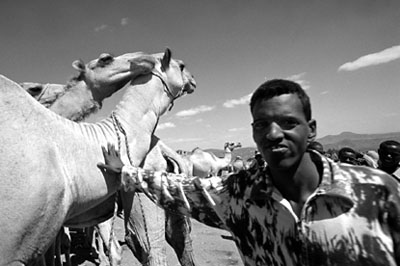 Babile boy who decided he was my guide |
I really would have preferred simply being pointed in the right direction, so I could walk there slowly and enjoy my people-watching. I politely but repeatedly told my expectant fans that I wanted to walk alone. But surrounded by a crowd of onlookers in a place that obviously doesn't see many ferenjos, I realized that a local "friend" could help keep them at a distance. I relented, and four of the boy's buddies immediately joined up.
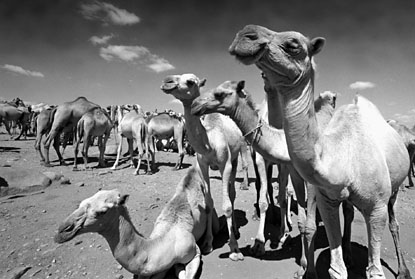 Camels! Just what I wanted to see! |
The market also featured farm creatures like goats and oxen, but the camels of varying sizes were the most impressive. I marveled at the sight of them, bubbling at the mouth, preparing to spit; nuzzling each other sleepily, and tugging violently away from their owners.
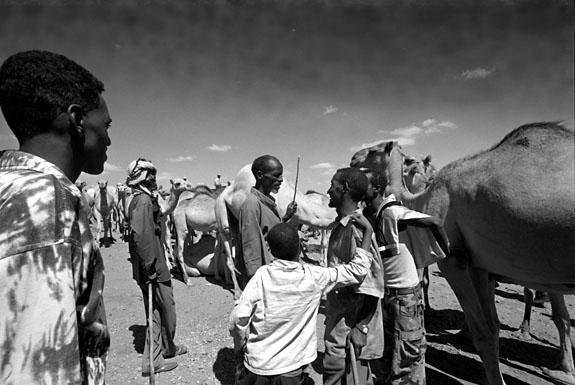
My teenage guide looks on as the friendly camel merchants chat
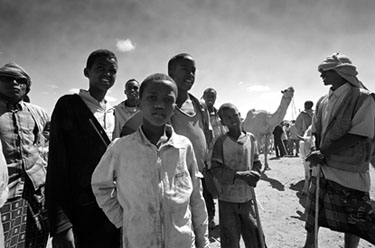 The crowd gathers around me... |
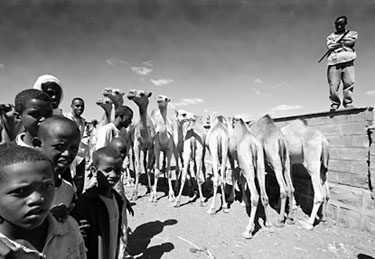 The boy in the front was apparently following me |
I had miscalculated the amount of help my teenaged "guides" would supply. As the mob around me grew, they did nothing but grin wider. When one ogling man drawled, "so will you be providing us with income today?" I felt a disgust that had nothing to do with camel drool. It was time to leave.
Unsurprisingly, as I headed to the roadside to wait for the bus, the main kid asked me if I would be treating them all to a meal for their services. Pretending not to understand, I brightly said I was ready to head back to Harar now. More insistently, he then said I should give them something for all their help. I sweetly reminded him I hadn't asked for his services, and even turned him down several times. This time he did not follow me.
My dramatic stomp-off was slightly diminished by the ensuing long wait for the bus. I wasn't even sure if I was looking for a bus straight to Harar or if any random bus heading west would drop me off.
One enterprising minibus driver offered me a private drive for the relative bargain price of 70 birr—this was after I'd already entered, thinking it was a regular bus. This was ten times the going bus fare (albeit only $8) and I had no real way of preventing him from picking up other passengers. I shoved hard out the door, knocking back some groupies in my haste to exit. A car pulled up and the driver asked where I wanted to go. When I said I was waiting for the bus, he dismissively said, "oh...you're poor." Flushed, unsure if this was sarcasm, I turned away in embarrassment. Another man tried to tell me there were no buses until the following day. It was beginning to seem possible.
Another converted camper finally arrived, but as Babile was just a stop along the route, I once again found myself taking the only remaining spot up front—facing my gawkers. This time there was no cushion on the platform, only a thin blanket.
The scenery in this region was stunning; as beautiful on this road as the one from Dire Dawa. We rolled past small traditional communities and pastoralists, lush green hills glistening under the sunny skies. The experience had been worthwhile, but a tough one to endure alone. Intimidating and confusing, and all just to see a few camels.